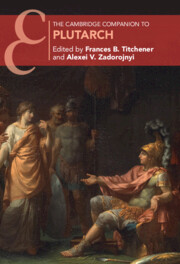Book contents
- The Cambridge Companion to Plutarch
- The Cambridge Companion to Plutarch
- Copyright page
- Contents
- Figures
- Contributors
- Acknowledgments
- Introduction
- Chapter 1 Plutarch and Biography
- Chapter 2 Romanness and Greekness in Plutarch
- Chapter 3 Plutarch As Moral and Political Educator
- Chapter 4 In the Spirit of Plato
- Chapter 5 Plutarch As a Polemicist
- Chapter 6 Religion and Myth in Plutarch
- Chapter 7 Plutarch at the Symposium
- Chapter 8 Language, Style, and Rhetoric
- Chapter 9 Plutarch and Classical Greece
- Chapter 10 Great Men
- Chapter 11 Thinking “Private Life”
- Chapter 12 Wealth and Decadence in Plutarch’s Lives
- Chapter 13 Plutarch and the Barbarian “Other”
- Chapter 14 Plutarch and Animals
- Chapter 15 Plutarch in Byzantium
- Chapter 16 Plutarch in the Italian Renaissance
- Chapter 17 Plutarch and the Spanish Renaissance
- Chapter 18 Plutarch and Shakespeare
- Chapter 19 Plutarch in France
- Bibliography
- Appendix: Plutarch’s Moralia
- Index Locorum
- Index
- Cambridge Companions To …
Chapter 6 - Religion and Myth in Plutarch
Published online by Cambridge University Press: 29 June 2023
- The Cambridge Companion to Plutarch
- The Cambridge Companion to Plutarch
- Copyright page
- Contents
- Figures
- Contributors
- Acknowledgments
- Introduction
- Chapter 1 Plutarch and Biography
- Chapter 2 Romanness and Greekness in Plutarch
- Chapter 3 Plutarch As Moral and Political Educator
- Chapter 4 In the Spirit of Plato
- Chapter 5 Plutarch As a Polemicist
- Chapter 6 Religion and Myth in Plutarch
- Chapter 7 Plutarch at the Symposium
- Chapter 8 Language, Style, and Rhetoric
- Chapter 9 Plutarch and Classical Greece
- Chapter 10 Great Men
- Chapter 11 Thinking “Private Life”
- Chapter 12 Wealth and Decadence in Plutarch’s Lives
- Chapter 13 Plutarch and the Barbarian “Other”
- Chapter 14 Plutarch and Animals
- Chapter 15 Plutarch in Byzantium
- Chapter 16 Plutarch in the Italian Renaissance
- Chapter 17 Plutarch and the Spanish Renaissance
- Chapter 18 Plutarch and Shakespeare
- Chapter 19 Plutarch in France
- Bibliography
- Appendix: Plutarch’s Moralia
- Index Locorum
- Index
- Cambridge Companions To …
Summary
Though a priest at Delphi, Plutarch resolutely refuses to give us what we would most like to have: an insider’s view of the oracular shrine and an account of the religio sacerdotis. What he does tell us about varieties of religious belief is largely negative (On Superstition), and the corresponding positive account is difficult to reconstruct. He has, however, a commitment to inquiry and to the interrogation of the polyvalent symbols of religion and of myth. Reductive solutions are rejected, along with any interpretations that would lead to a decrease of piety. In the myths that he creates for his own dialogues, in imitation of Plato, he generates his most characteristic and memorable rhetorical exercises in the sublime.Once misleadingly branded "theosophical essays," these myths are in fact virtuoso display pieces that show Plutarch at his best as a writer and educator.
- Type
- Chapter
- Information
- The Cambridge Companion to Plutarch , pp. 122 - 137Publisher: Cambridge University PressPrint publication year: 2023

